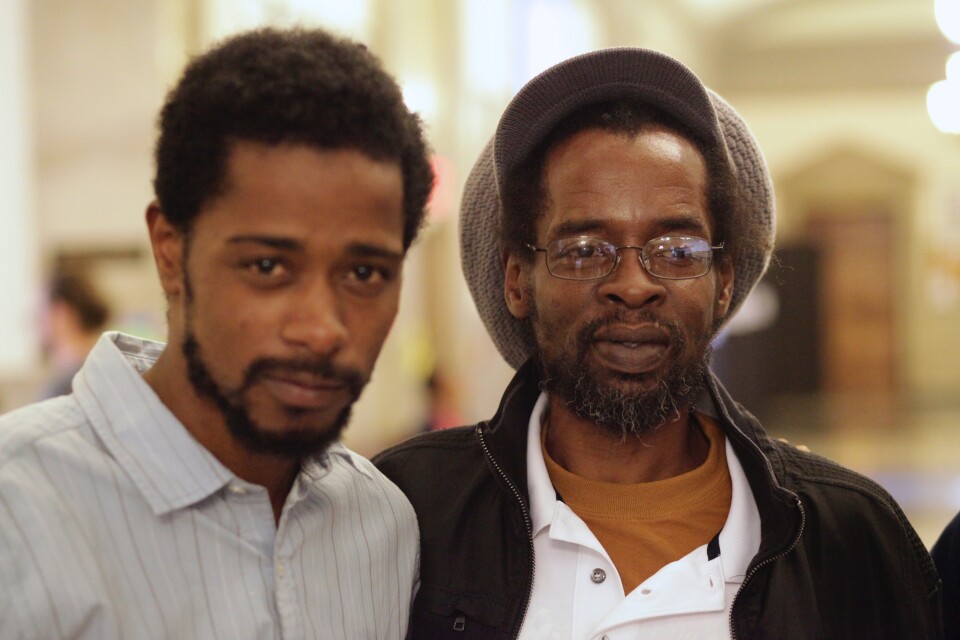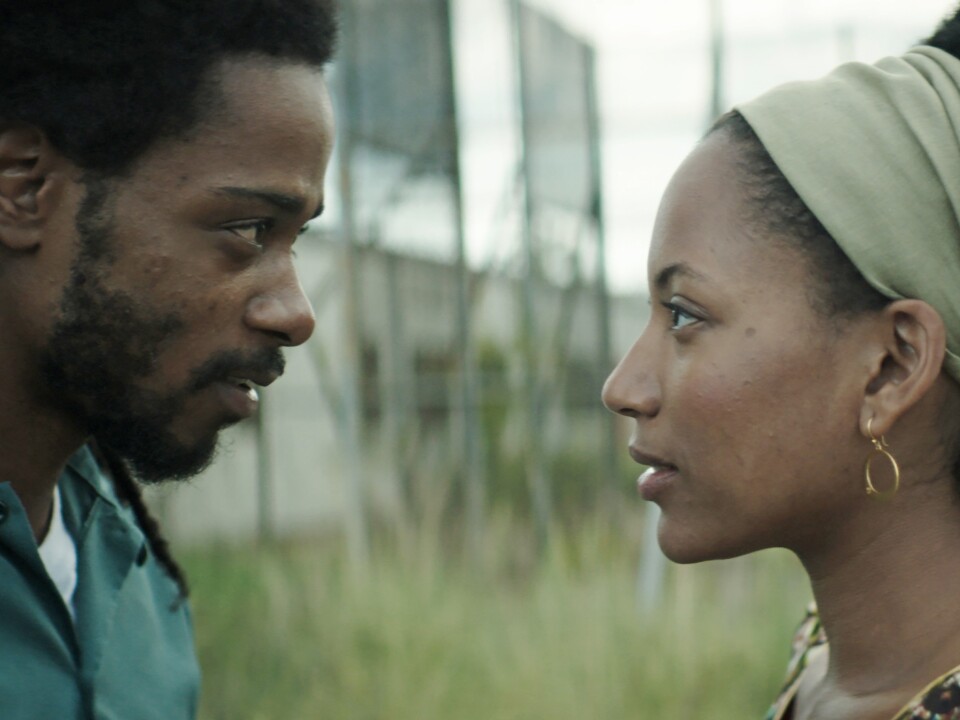The Frame host John Horn reports from Sundance where he interviews Lakeith Stanfield (“Atlanta” and "Crown Heights"), and talks Oscars nominations with Vulture's Kyle Buchanan.
2017 Academy Award nominations: #OscarsSoWhite struggle is far from over
By now, the list of the 89th annual Academy Award nominations has made the rounds. Let's analyze Tuesday morning's announcement. John Horn and Kyle Buchanan, senior editor for Vulture and John's co-host on The Awards Show Show podcast, take a closer look at this year's nominees.
Objectively, the names on this year's Oscar hopefuls list are certainly more diverse than prior years, but to echo April Reign (she created the hashtag #OscarsSoWhite), who spoke to John and Kyle a few weeks ago: "There's still a lot of work to be done."
Segment Highlights
John: "If we look at the big picture nominees, there is certainly some good news [with] movies that are led by African American casts. We have "Fences," we have "Hidden Figures," we have "Moonlight" ... all deserving, all great nominees. But once you get beyond picture and then the acting categories, it really becomes representative of what the [Motion Picture Academy] has struggled with for many years."
Kyle: "That's exactly what we need to be broadening our perspective on. It's very encouraging that a lot of black talent was nominated this year, but aside from Dev Patel who was nominated, there's so many other types of people of color that are not getting their due and are not having stories made about them, frankly. And I think we see a lot of behind-the-scenes evidence that so many categories will continue to be dominated by men. Even when you look at something as innocuous seeming as the best actress category, I think it's very telling that only one of those nominees, Emma Stone from "La La Land," is in a movie that was nominated for best picture. Whereas four of the five best actor nominees, were in best picture movies.
"I think that speaks a lot about the Academy's unwillingness to take female-fronted stories as seriously as they ought to. So, I think there's a lot of interesting and sometimes vexing currents just underneath the surface here."
Why is diversity important?
John: "The people who are getting jobs in Hollywood, or anywhere else, should represent the way that the nation is made up. And the equally important thing is that if you're a young person and you want to be in the film business and if you're thinking about directing, if you're thinking about cinematography, if you're thinking about editing ... if you're watching the Oscars and you don't see anybody who is a person of color or a woman who is openly gay or lesbian ... then I think you don't see yourself in that job. And that's why it's incredibly important beyond the acting categories."
Kyle: "To a certain extent the Academy can only work with what they're given by the studios, and so a lot of this is dependent on what studios and people with the money choose to make. And I hope that they will look at the success of movies like "Moonlight" and "Fences" and "Hidden Figures" and make more movies like that because all of these films paid off financially. "Hidden Figures" is a gigantic hit and Oscar responded to them, too."
Hope for the future
John: "One thing I will end with — that I think gives us both some encouragement — is that when we look at the movies that we're seeing at the Sundance Film Festival this week, we are seeing an incredible array of people in front of and behind the camera. Trans women filmmakers, actors of all denominations: race, gender, ethnicity. I guess the question is, How long will it take that to trickle up to the Academy?"
Lakeith Stanfield finds beauty within tragedy in 'Crown Heights'
This interview originally aired in January, 2017 during the Sundance Film Festival where "Crown Heights" had its premiere. The film had its theatrical release on August 18.
Actor Lakeith Stanfield seemed to be everywhere at this year's Sundance Film Festival. The 25-year-old actor already has an impressive list of credits, including "Selma," "Straight Outta Compton" and the TV show, "Atlanta."
And he was in three films that premiered at Sundance 2017: the false imprisonment drama, "Crown Heights"; the romantic comedy, "The Incredible Jessica James"; and Jordan Peele's psychological thriller, "Get Out."
"Crown Heights" is based on the true story of Colin Warner, a Trinidadian immigrant living in the Crown Heights neighborhood of Brooklyn in the 1980s. At the age of 18, he was convicted for a crime he did not commit and spent 21 years in prison maintaining his innocence. Stanfield plays Warner, while former NFL player turned actor and producer Nnamdi Asomugha, plays Carl King, Warner's longtime friend who fights for his freedom.
Stanfield stopped by the Frame's Sundance condo the day before the premiere to talk about his experience making "Crown Heights" and "Get Out."
Interview Highlights:
On meeting Colin Warner, the central character in "Crown Heights":
Well, I think, no one could describe better who Colin is than him. But what I would say, based on my interaction with him, is that ... he's a real human. And what it means to be human is to persevere and survive. And I think he's done that. And I don't mean just live, I mean survive — I mean really exist and have a good head on your shoulders and good disposition. That's what it, to me, means to truly live. Because if you're miserable, how can you really enjoy these sorts of fruits of life? He's made an effort to teach himself lessons that have made him a better person and have made him a person that I respect ... The fact that he maintained his innocence over 20-plus years in prison was, to me, crazy and amazing.
On depicting Warner's unjust incarceration:
I'm really grateful for him for being so open. He didn't have to let us into his life. As I was traveling around to prisons in preparation for the role, I was meeting with a lot of dudes who were in prison at the time. I wanted to make a point to not say, Hey man, I want to take your experiences and turn them into a film. We're going to cash in and get this thing rolling. That wasn't my intention. I wanted to be careful with Colin to be sure he knew that wasn't my intention. My intention was to find out how someone could remain so beautiful after going through something so tragic. By hanging around with someone like that, you gain understanding.
He's a proponent of the Yoruba religion. He invited me to this shrine and his wife was there. He [said], You really want to know how I made it through all of this? He just pointed at her. She remained his backbone. Why would you remain a backbone for somebody? Because she knew, not only that he was innocent, but that his heart was good. She knew he had a good heart and I knew he had a good heart. That made me have the wherewithal to play this character.

On working on "Get Out":
To be honest with you, shooting on that film was one of the creepiest experiences that I've ever had on set. I'm really excited because my hope is that people will experience it the same way that I experienced it, which is creeped the hell out.
On being part of the cultural and political conversation:
I'm just fortunate enough to exist in the zeitgeist where you can blow that out in a big way. You can make it available to a lot of different people at one time. But it's nothing different than what we're seeing already on the ground every day. So I don't think that [African Americans] have a particular thing that makes us special, but I think what it is, is that people are special, but they don't get a chance to say it all the time. So shows like "Atlanta" and movies like "Get Out" get to show that perspective in a broad way, which I think is great and I'm excited by because it hasn't always been that way. Slowly but surely, there's more and more about people who didn't have a voice before, having a voice and a platform.
On why he became an actor:
I guess it was just watching VHS [movies] all the time. I liked the stories that I was being presented with and I thought that it was cool that people were telling these stories. When I was really young, I couldn't differentiate whether it was real or fake. As I've gotten older, I still can't differentiate because it's still the same thing. What's fake implies real and vice versa. But I think early on, in the stages of me watching those, it led me to believe that at some point, I could perhaps touch people in that way. I was looking at those actors and going, I could do that. In fact, if I were to do it, I would do it this way. That was my way of watching movies when I was really young.

On leaving San Bernardino and starting his acting career:
I jumped into a car and I drove to L.A. and I didn't leave that car for a couple years. I lived out of that car. The car was my home. I had a couple of brilliant people who believed in me and helped guide me through that process. One of those people was Destin Cretton from [the film] "Short Term 12." He really provided a great blueprint and a great helping hand for me in those times when it was really difficult to get through. Even at the time, though, I didn't really think of it like a bad thing. I just thought of it as a phase and a transition — that some day I'm going to be able to do what I want to do and this is just part of it. So I accepted it and I lived it.
On meeting Donald Glover and getting his role in "Atlanta":
I met [Glover] at a party and I was just drunk on the dance floor and doing what I do, which is dance. I got moves. They're sick. Hey, check me out. So I'm dancing and I brush up against Donald and he says, Hey, you know, I think you'd be good for this role. I might do this TV show thing ... So I do a self tape. He's like, That was cool. Now do another one for the network. And I do another one for the network. The next thing I know, we're going to shoot the pilot.
To hear the full interview with Lakeith Stanfield, click on the player above.




